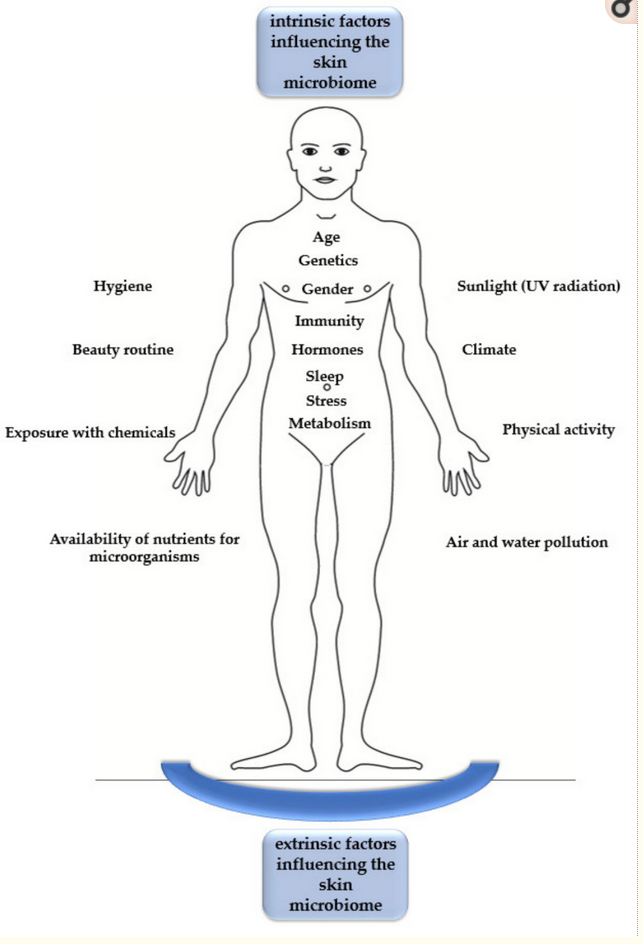Welcome to thoughtful, organic beauty
Hello Joyous is an organic, plant-based, sustainable beauty brand here to bring more joy to your day.
The skin is the body's largest organ and it makes up nearly 15% of your total body weight. It is of great importance for the immune system since it's your body's first line of defence against pathogens. It is a protective barrier from allergens, pollution, foreign microbes, toxic substances, and free radicals, while retaining moisture and nutrients to give you that healthy glow!
In this post I'm going to review the following:
What is the Skin Barrier?
Your skin barrier is the outermost layer of your skin. It's called this because it's the protective barrier between you and the outside world. There are three components to the skin barrier: the micobiome , the acid mantle, and the lipid barrier - they all work together symbiotically to keep your skin healthy and glowing. Today we are going to dive into an essential component of the skin barrier, the skin microbiome.
Your skin microbiome impacts the overall health of your skin because it can alter the all-important barrier function.
What is the Skin Microbiome?
Just like your gut microbiome is home to billions of diverse microbes, your skin has its own microbiome too! Your skin microbiome is comprised of billions of invisible (to the human eye) microbes (bacteria, fungi, and viruses) that live on your skin this very minute! In fact, it's been stated that one square centimetre of skin has over 1 billion microbes!
Depending on the area of skin on your body, the types of microbes hanging out there can vary dramatically. For instance, the microbes on your armpits differ from those on your face and areas of the skin that are very dry, such as the knees and elbows, have a very low diversity of microbes.
That being said, most skin bacteria fall into four different phyla: Actinobacteria, Firmicutes, Bacteroidetes, and Proteobacteria.
Interestingly, these four dominant phyla also constitute the microbiota that is found on the inner mucosal
surfaces of the gastrointestinal tract and oral cavity!
Factors that impact the types of microbes that live on your skin include the location on your body, your age (life stage i.e. puberty or pregnancy), gender, the environment and geographical location you live, overall inflammation levels, your occupation, personal hygiene, beauty routine: cosmetics usage (soap, moisturizers), antibiotic usage, clothing, physical activity, and your overall health.

Photo source: NCBI
As you can see, there are many factors you can control that directly impact your skin microbiome.
The Role of the Skin Microbiome
Research is still emerging on the importance of the skin microbiome but we do that know two of the most important roles of the skin microbiome are to regulate inflammation and serve as a barrier against foreign invaders (bad bacteria, viruses, fungi, yeast, pollutants, allergens and more). Essentially, the skin microbiome is there it ensure the proper functioning of the skin.
The Skin and Immune System
A healthy skin microbiome is the foundation of the skin's immune system. Simply stated, good bacteria that live on your skin fight off the bad bacteria on your skin - that is the skin's immune system. The skin's immune responses can modulate the skin microbiome and the microbiome educates the immune system. It's a two-way street!
The dominant resident species of skin bacteria are commensals (good bacteria). Together with immune cells and keratinized skin cells (which get replaced every four weeks), these are responsible for the appropriate skin immune barrier functioning. I probably sound like a broken record, but it's worth repeating that the skin microbiome is one very important part of the skin barrier and the health of this barrier is everything when it comes to healthy skin!
Signs Your Skin Microbiome Needs Help
The health of your skin microbiome is not solely responsible for skin issues, but it is one critical factor that is often overlooked.
The skin is an ecosystem. Disruption to this delicate balance, such as hand sanitizers or overwashing the face or using products with heavy preservatives (these are antimicrobials) can disrupt the skin microbiome which plays a role in the overall health of the skin. Altering the diversity of microbiota (as is the case with hand sanitizer or excessive handwashing) can lead to skin conditions like eczema as it impacts the skin barrier function. Research has shown low diversity of beneficial microbes and high numbers of Staphylococcus aureus are found in eczema prone skin.
What Can Alter/Harm the Skin Microbiome
There are factors that can alter or harm the skin microbiome and therefore impact the health of your skin including:
6 Ways to Care for your Skin Microbiome Inside and Out
1. Eat Healthily.
Sounds simple right? I can't emphasize this point enough. Using the best topical products and taking all the right supplements just won't cut it if you're eating the Standard American Diet full of sugar, refined grains, inflammatory fats, food additives, and inadequate micronutrients.
Enjoy a variety of plant-foods (at least 30 different plants per week), whole foods, good quality protein from sustainable sources (animal or plant-based), healthy fats, and drink plenty of filtered water. Nutrition doesn't have to be complicated. We get all inside our head about this when we really need to tune into what we innately know our body needs to be nourished. I have written three wonderful bestselling cookbooks that can help guide you there and I have hundreds of whole food recipes right here for you to enjoy.
2. Support your gut health.
It's been established that digestive disorders can manifest on the skin as eczema and rosacea. Inflammatory-based gut disorders almost always have a skin component. This makes sense because our skin is a reflection of the health of our digestive system and if our gut is inflamed, our skin often is too.
The Gut-Skin Axis
Many studies (both animal and human) suggest that the intestinal microbiome’s influence extends beyond the gut, and in fact contributes to the function, and dysfunction, of distant organ systems like the skin!
This axis is a pathway that goes both ways. The gut is in communication with the skin and the skin is in communication with the gut. Your gut microbes send signals to your skin that can influence inflammation, production of oil and the structure and overall health of the skin. If your gut is disrupted, this will impact the skin negatively.
There are various angles to look at this link between gut health and skin health. If we don't properly absorb and assimilate nutrients from our food, we lack essential vitamins for healthy skin such as vitamin A, E, C and more. Additionally, not only is our skin our largest organ but it is an organ of elimination too. Hormones, toxins and waste products that don't get effectively eliminated through the bowels can end up getting re-absorbed back into the blood circulation and can have negative consequences for the skin.
In order to support gut health, it's crucial to avoid sugar and food additives and if you have skin issues then it's essential to avoid common food sensitivities such as gluten, corn, soy, and dairy. While this may seem daunting at first, it's easier than you think! You're in the right place because as mentioned in the previous point, I have 100s of recipes to guide you.
3. Get outside into nature regularly.

Getting outside in nature exposes you to foreign bacteria and viruses that you don't have exposure to indoors. This regular exposure trains the immune system not to overreact to harmless substances. A great example of this is how it's absolutely essential to allow children to explore the outdoors as young as possible and not live in a sanitized sterile bubble. It's been established that one of the ways to train the immune system is by getting outside.
Your skin is an important part of your immune system. What's good for the immune system is good for the skin. Not to mention, it's also an excellent way to combat the overstimulation of technology for our nervous system. In other words, nature is a great way to unwind and relax.
Establishing a good skincare routine is key to healthy, glowing skin.
4. Gently remove impurities from your face at the end of each day.
Establishing a healthy skincare routine is essential to care for your skin microbiome. Look for products that do not contain any hormone disrupting ingredients or harsh chemicals that can disrupt the skin microbiome.
It is important to cleanse each night before bed to remove pollution, cosmetics, chemicals, dirt, and oil because you don't want these chemicals sitting on your skin. Additionally, some products like harsh cleansers can really strip the skin and alter the pH making it too alkaline, which weakens the skin microbiome and barrier.
Cleanse with a product with gentle ingredients that do not strip the natural oils, alter the microbiome or the pH of your skin. Fresh Face is an excellent choice because the ingredients are gentle and nourishing. It includes ingredients such as anti-inflammatory comfrey root, skin-softening jojoba, and organic glycerin all of which make your skin feel supple and refreshed, not stripped, tight, and dry.
5. Balance and tone the skin daily with a facial toner.
Using a toner is extremely beneficial to balance, nourish, and tone the skin. Applying toner before your moisturizer or serum provides the perfect dewy surface for your serum and aids in absorption. It's also a great way to freshen up the skin midday!
In order for good microorganisms to multiply on your skin, the pH needs to be balanced. Many skincare products are too alkaline (think soap or harsh chemicals). The skin is slightly acidic therefore it is paramount that your toner not alter this pH too much.
Our Magical Mist is an alcohol-free daily soothing facial toner that nourishes and balances your skin. It has a magical combination of skin-lovin' anti-oxidant rich organic ingredients like anti-inflammatory rose geranium to calm, calendula to soothe, and witch hazel to keep the pH balanced and toned.
6. Hydrate and strengthen with a serum.
After cleansing and toning your skin, you'll want to replenish it with something super nourishing and hydrating for the skin. This helps to seal in moisture and support the lipid layer of the skin barrier.
Hella Hydrating is a replenishing serum that nourishes and hydrates the skin while sealing in moisture for smoother, softer skin. Nourish and hydrate your skin with the power duo of cold-pressed rosehip oil and hyaluronic acid.
The anti-inflammatory and antioxidant-rich nutrients in this serum will calm irritation, reduce fine lines and help your skin glow, not to mention, make your skin feel hella hydrated! Hydrated skin is skin that looks naturally youthful, healthy and vibrant.
There you have it! 6 ways to care for your skin inside and out with an emphasis on your gorgeous face. I hope you find this information helpful.
Wishing you joyous glowing skin!
Joy